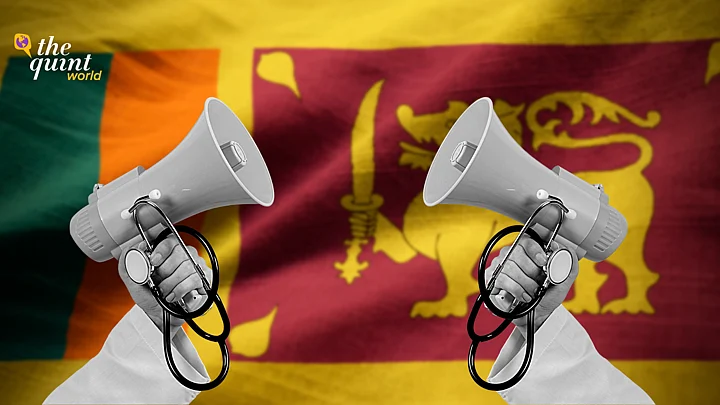Dr Lahiru (name changed), 35, used to work in a small rural hospital in the outpatient and the emergency department in Deiyandara, Matara, in the southern province of Sri Lanka.
He was one of the five doctors in this government hospital serving a community of nearly 30,000 people. “Situation kept worsening day-by-day last year due to shortages of life-saving and even basic medicines,” he said.
“It was extremely difficult not only for the patients but for us doctors as well, as we could not treat them properly.” After wrestling with the decision to move abroad for months, Dr Lahiru finally left for Dubai in August last year.
He is one of over 1000 doctors and healthcare professionals who have left since the massive unrest in Colombo last year, which forced the then-disgraced President Gotabaya Rajapaksa to flee the country.
Nearly 60 doctors in Sri Lanka are applying for leave each month for employment abroad, as the island nation continues to suffer from its worst economic crisis in decades.
One more staff has now left Deiyandara, says Dr Lahiru, leaving the hospital with just three doctors who are completely overwhelmed with the workload.
The South Asian nation is well known for its free healthcare to citizens and has always done well on health indicators despite a lack of spending on public health.
However, Sri Lanka’s health system is currently in tatters, so much so that the health ministry has asked the government hospitals to delay all non-essential and non-urgent surgeries due to catastrophic shortages of drugs and equipment.
Doctors, nurses, and healthcare professionals across Sri Lanka have been protesting outside hospitals for months over shortages of medicinal supplies and better working conditions.
The government of President Ranil Wickremesinghe, who took over after mass protests against economic mismanagement ousted his predecessor last year, is implementing savage budget cuts and tax hikes to clinch a sorely needed $2.9 billion International Monetary Fund (IMF) loan to tackle the financial crisis.
A recent measure includes a whopping 66% rise in electricity prices in February, the second power price increase since a 75% rise in August last year. “These hikes are impacting the health sector “very significantly,” says Dr Vinya Ariyaratne, President of the Sri Lanka Medical Association (SLMA).
Ariyaratne further adds, “It's not just electricity. Hospitals consume a huge amount of water for sanitation purposes. Water purification and water tariffs will also be affected because the Water Supply and Drainage Board uses electricity for purification and pumping. While the government claims an average 66% hike, it could be as high as a 200% increase in some cases.”
Sri Lanka is also collecting massive funds via a 15% value-added tax on essentials, including food items, fuel, and telecommunications, as part of IMF austerity measures.
All monthly wages above 100,000 Lankan Rupees (USD 275) are now subject to a 6 to 36% income tax, adding more misery to people who are already struggling with eye-watering inflation of 55%.
Healthcare workers have not been spared from these significantly increased taxes.
“It's very difficult. Even before the end of the month, all my salary gets vanished. I have to pay for the rent, which is increasing, and the food prices are also increasing. I also have to take care of my family,” says 30-year-old Azaff Mohamad, a medical officer in surgery at Teaching Hospital, Batticaloa, in the eastern province.
The government is also planning to reduce the overtime allowance for health workers, and if that happens, “I won’t be able to survive at all,” adds Azaff.
It’s situations like these that are forcing doctors to take difficult decisions and consider their options abroad for a better life, according to Dr Ariyaratne.
“They are very worried about their children, their families, and the instability in the country.”
President Wickremesinghe has defended his hugely unpopular moves as the only way out of the crisis for the cash-strapped country and to secure the IMF money. "I want to rebuild this nation from the crisis it has fallen. I'm ready to make unpopular decisions for the sake of the nation. People will realise the importance of those decisions in two to three years,” he said in a recent speech.
The island nation entered into a preliminary agreement with the IMF in September, but the UN body says it will disburse the much sought-after loan only after Sri Lanka restructures its previous debts in a sustainable manner.
Neighbouring India extended a credit line of $1 billion in March for crisis-hit Sri Lanka, $200 million of which have been allocated to import essential drugs.
World Health Organisation (WHO) and Asian Development Bank (ADB) have also granted emergency funds for medicine imports, but Sri Lankan Health Ministry has conceded that the money was used instead to make fuel payments and government employee salaries.
The ministry recently came under fire for allegedly placing orders for sub-standard and non-necessary medicines from two Indian suppliers who are not registered for purchase in Sri Lanka under the Indian credit line.
A parliamentary committee also found that the same generic drugs have been imported under different trade names. However, Health Minister Keheliya Rambukwella has denied any irregularities in medicinal procurements.
Sri Lanka will remain bankrupt until 2026, President Wickremesinghe has said. But Azaff says he does not see any end in sight for the sufferings in the country’s healthcare sector.
“I don’t know when the help will come. I am barely surviving. If my scenario worsens, I will resign from my job and go, not only for my future but for my family's too.”
(The author is a journalist based in London)
